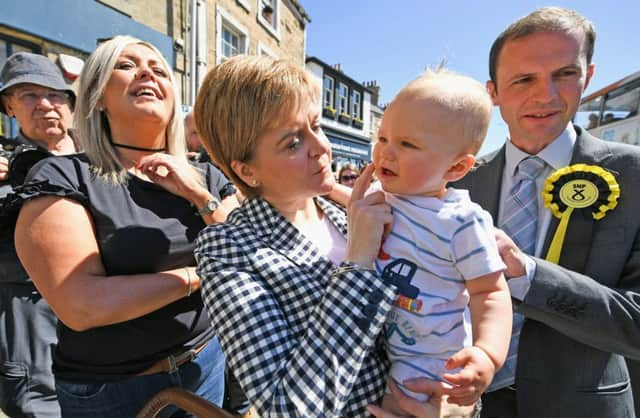Brian Monteith: Unionists are on the march thanks to the SNP


The unfolding events of the latest London terrorist assault, following the Manchester atrocity, are unlikely to change this fact substantially.
If we take the United Kingdom as a whole we have had three debates, for Northern Ireland is already ahead of Scotland. For decades now it has been casting votes that are defined as unionist or nationalist, each with a myriad of parties, but weighed-in for either of the two piles. The point is that the revival of unionism in Scotland as a brand – a non-sectarian belief in Britain and remaining British – has been because of the SNP.
Advertisement
Hide AdAdvertisement
Hide AdBy creating a binary divide and continually stoking it with bitterness and grievance, the SNP has fed unionist solidarity. With three unionist parties, each claiming different approaches and varying degrees of devotion to the UK, there can be no Stalinist discipline as there is in the SNP, but there is a recognition that Scots want their failing public services rescued and that we already have the powers to do this – if only the Scottish Government would use them.
Thus in Scotland the general election question has focused not on Brexit, not on economic austerity, not even on social care. No, it has focused on independence and whether or not we should have a second referendum. It is not that the Unionist parties have been avoiding other issues – quite the contrary – but the snag for the SNP is that the funding and delivery of public services is devolved and has been under the SNP’s control for ten years.
When education or the NHS has taken centre stage in Scotland it has come about not through deft opposition campaigning but because of scandalous figures on falling literacy standards among our children or the SNP First Minister being taken to task by a nurse or teacher on live television.
Not only has this left Nicola Sturgeon struggling to find excuses, it has quickly rebounded on the SNP by exposing her and the government she leads for failing to do the day job. These episodes keep bringing the debate back to the SNP’s fixation on independence – where the SNP is clearly in retreat. Having had time to take stock of the general election momentum swinging to the Unionists, Ms Sturgeon is backtracking on the timing of a second referendum, but when she “wins”, as her party is likely to, she’ll then claim she has been right all along.
This will be disingenuous in the extreme. While the SNP can expect to be the largest party, both its number of MPs and vote share will fall. Despite erratic polling the total vote of the Unionist parties is regularly over 50 per cent and has even been over 60 per cent. That the first-past-the-post system can be expected to return more SNP MPs on this occasion will not mean the First Minister will have won a mandate. All eyes will instead be on the gains made at the SNP’s expense, not least those of the Conservatives who will add to Mrs May’s majority.
Ms Sturgeon’s will be a pyrrhic victory at best. Having spent much of the last year gallivanting around Europe and the United States talking up a second independence referendum against the wishes of the Scottish people, the First Minister has seen her popularity crash to now become the most unpopular leader in Scotland.
Encouraged by the evidence that peak SNP was reached in the general election of 2015, following which the party has lost elected members at the Holyrood and council elections, there has been a spring in the step of Conservatives who believe they can reach double figures in their number of MPs. In specific constituencies Labour and Liberal Democrat candidates are also hopeful of doing well.
There is a tangible sense that Ms Sturgeon has lost her appeal, that she is out of touch with the public and has overplayed her hand. There was a time when she played sweet mood music and talked of charming Unionists over to the cause of independence, but now she sounds shrill and her supporters become more and more objectionable by the day.
Advertisement
Hide AdAdvertisement
Hide AdLast week some cybernats even rushed to the airwaves to suggest the Manchester attacks were not coincidental to a need by the Tory Prime Minister for a distraction from poor polling results.
Now Saturday night’s bloody scenes might yet convince some Unionist Scots to allocate their votes based on security issues, and if that is the case Mrs May could be expected to benefit at the expense of Mr Corbyn, who came out against a shoot-to-kill policy following the terrorist attacks in Paris. Along with his failure to condemn specific IRA terrorist killings in the past and his friendship for other terrorist groups such as Hamas and Hezbollah, the Labour leader has a weakness on national security that might transfer through to Ruth Davidson’s Conservatives.
Nothing, however, is certain. The variation in polling continues to eat away at any certainty, ensuring the election results will be a cliffhanger. If the Unionist parties have a dozen or more MPs by Friday morning it will give the perception that Scottish politics has returned to being normal, but it will be a mistake to think that. The outcome will have been achieved on the back of SNP chronic mismanagement, social division and a devotion to independence at any cost – be it failing education, an economy on the brink of recession or the prospect of austerity max that even Greek citizens would not recognise.
Ms Sturgeon’s authority will have been challenged – and there will probably be some very unhappy people in her party blaming her for using the wrong strategy that will seek to challenge her too. Peak SNP has undoubtedly passed, but Peak Davidson is a long way off from being determined.